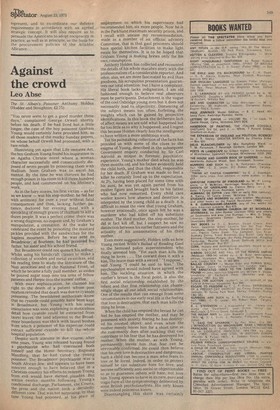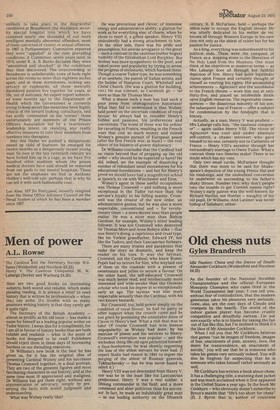Against the crowd
Leo Abse
The St. Alban's Poisoner Anthony Holden (Hodder and Stoughton: £2.75) You never seem to get a good murder these • days," complained George Orwell shortly before his death. If he had lived but a little longer, the case of the boy poisoner Graham Young would certainly have provided him, as all those readers of the murky Sunday papers, on whose behalf Orwell had protested, with a rare relish.
Illustrating yet again that Life imitates Art, the boy Graham Young found his inspiration in an Agatha Christie novel where a woman character successfully and consecutively disposed of seven people by poisoning them with thallium. Soon Graham was to excel his mentor. By the time he was thirteen he had enough poison in his room to kill three hundred people, and had commenced on his lifetime's work.
As in the fairy stories, his first victim – as far as we know — was his step-mother: he fed her with antimony for over a year without fatal consequences and then, lacking further patience, doctored her evening meal with a sprinkling of enough grains of thallium to kill a dozen people. It was a perfect crime: there was a wrong diagnosis, no inquest and, by Graham's manipulation, a cremation. At the wake he celebrated the event by poisoning the mustard pickles provided with the sandwiches for the hapless .mourners. Before he was sent to Broadmoor, at fourteen, he had 'poisoned his father, his sister and his school friend.
But Broadmoor could not quench his ardour. Whilst using his handicraft classes to make a collection of wooden and metal swastikas, and
his reading time to study the literature of the Nazi atrocities ,and of the National Front, of
which he became a fully paid member, as asides he poured sugar soap into tea urns of fellow patients and Harpic into the nurses' coffee.
With more sophistication, he claimed his right to the death of a patient whose post rnortem retrealed that death was due to cyanide Poisoning. The bewildered _authorities knew that no cyanide could possibly have been kept in Broadmoor, but Young with his usual insouciance was soon explaining in meticulous detail how cyanide could be extracted from laurel leaves: the land adjacent to the Broadmoor boundaries was thick with laurel bushes from which a poisoner of his expertise could extract sufficient cyanide to kill the whole hospital population. Despite such alarums in due course, after nine years. Young was released having found a psychiatrist who had convinced both himself and the Home Secretary, Reginald Maudling, that he had cured the young
Poisoner . The Broadmoor psychiatrist was a
South African Jew, and appears to have been innocent enough to have believed that in a
Christian country his efforts to redeem Young from evil would have darned plaudits. But within twelve months following Young's conditional discharge, Parliament, the Courts, the press and the nation took a decidedly different view. That was not surprising: by that time Young had poisoned, at his Place of
emi3loyment to which his supervisors had recommended him, six more people. Now he is in the Parkhurst maximum security prison, and I recall with unease my recommendation, made as a member of an official advisory Committee, that in that gaol prisoners should have special kitchen facilities to make light meals for themselves. It is to be hoped that Graham Young is making brews only for his own consumption.
Anthony Holden has collected and recounted the details of his whole macabre story with the professionalism of, a considerable reporter. And since, alas, we are more fascinated by evil than goodness, his scrupulous presentation guaran tees our total attention: but I have a complaint.
His liberal book lacks indignation. I am old fashioned enough to believe real observers must be participants. Detachment is the vogue of the cool Oxbridge young men but it does not necessarily lead to objectivity. Distancing of the subject means too often forfeiting the insights which can be gained by projective identifications. In this book the deliberate lack of affect means we are told what happened but far too little as to why it happened: and I regret this because Holden clearly has the intelligence to have written a more ambitious work.
Yet his painstaking collection of the facts has provided us with some of the clues to the enigma of Young, described in the subsequent Government enquiry conducted by Sir Carl Aarvold as unique in forensic psychiatric experience. Young's mother died when he was three months old, and his father evidently held the child birth, and thus the child, responsible for her death. If Graham was made to feel a killer he certainly lived up to the expectation. At 21/2, having been placed for some time with his aunt, he was yet again parted from his mother figure and brought back to his father who had now remarried. Every child care worker knows how absence and desertion is interpreted by the young child as a death: it is difficult to resist the view that young Graham, however irrationally, once again felt he was a murderer who had killed off his substitute mother. The third mother, the step-mother, he did in fact kill off, but I suspect he saw no distinction between his earlier fantasies and the actuality of his assassination of his third mother.
Even more suggestively, Holden tells us how Young recited Wilde's Ballad of Reading Gaol to the bemused police superintendent who finally arrested him. "Yet each Man kills the thing he loves. . . The coward does it with a kiss, The brave man with a sword." "I suppose," said Young "I could be said to kiss." The psychoanalyst would indeed have agreed with him. The suckling situation, in .which the mother's breast is the focal point, is also the first social relationship established by the infant and that first relationship can chasteningly shape all our adult social relationships. One of the results that can emerge from some circumstances in our early oral life is the feeling that love is destructive, that each man kills the thing he loves.
When the child has emptied the breast he can feel he has emptied the mother, and may be possessed with anxiety fearing he has destroyed his coveted object: and even when the mother merely leaves him for a short time as she customarily does after suckling that can contribute to his fear that he has destroyed his' mother. When the mother, as with Young, permanently leaves him that fear can be irrevocably confirmed. He could then believe that his own love is destructive and dangerous. Such a child can become a man who fears to love or be loved. Indeed, in order to protect himself he can substitute hate for love, and become sufficiently anti-social or objectionable so as to guarantee others will hate, not love him. Young appears to have in its rare, pure and tragic form all the symptomology delineated by some British psycholanalysts. His only kisses were indeed poisonous kisses.
Disentangling this skein was certainly unlikely to take place in the disgraceful conditions at Broadmoor, the maximum security special hospital into which we have crammed nearly one thousahd of our more intelligent mentally abnormal offenders, most of them convicted of violent or sexual offences. In 1967 a Parliamentary Committee reported they were "appalled" at the 'then prevailing conditions. A Committee, seven years later, in 1974, under R. A. B. Butler declared they were "astonished and shocked" at the conditions they then discovered. The overcrowding at Broadmoor is unbelievable, rows of beds right across the rooms no more than eighteen inches apart, and in these dormitories, lacking any privacy or cupboards, all these mentally disordered patients live together for years, or life, out of suitcases. An expert report submitted some months ago to the Department of Health which the Government is currently trying to keep secret has meantime been highly critical of the inward looking consultants, and has acidly commented on the 'nurses': these unfortunately are members of the Prison Officers Association led by a reactionary leadership intent on resisting any really effective measures to turn their members from turnkeys into therapists.
Into this Hades we pushed a dangerously mixed up child of fourteen: he emerged for < twelve months as a dangerously insane young man. So now in the late twentieth century we have locked him up in a cage, as we have five hundred other madmen whom the prison medical doctors have said should be removed from our gaols to our mental hospitals. These are not the emphases we find in Anthony Holden's well-told tale: perhaps that is why he can tell it with such fashionable cool.
Leo Abse, MP for Pontypool, recently resigned from the Home Office Advisory Council on the r, Penal System of which he has been a member ' since 1967.



































 Previous page
Previous page